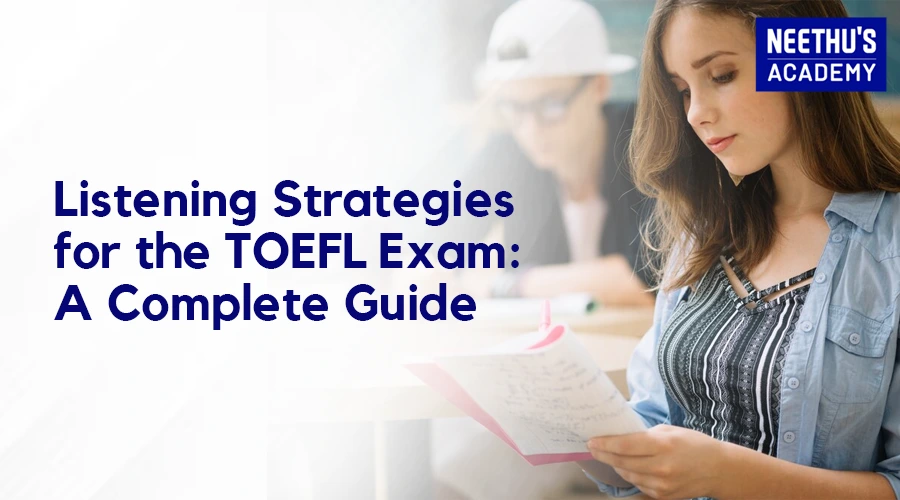Essential TOEFL Listening Strategies to Score High
Essential TOEFL Listening Strategies to Score High
The Listening section of the TOEFL exam is one of the most critical parts of the test, designed to assess how well you can understand spoken English in academic and everyday contexts. For many test-takers, improving TOEFL listening skills can seem like a daunting task, particularly given the diversity of accents, fast-paced speech, and academic vocabulary encountered. But with the right TOEFL listening strategies, anyone can improve their comprehension, boost their scores, and feel confident on test day. This guide will take you through effective TOEFL listening tips, TOEFL listening exercises, and audio practice recommendations to help you go great in this section.
The TOEFL Listening Section tests your ability to understand and analyze spoken English in academic settings, and requires high focus and detail. For this section, you will listen to a combination of conversations and lectures, and your ability to grasp key ideas, details, speaker attitudes, and implied meanings shall be tested. This blog takes a holistic approach toward enhancing your listening skills for the TOEFL test with extensive strategies, common challenges, resources, and tips for TOEFL audio practice.
Overview of the TOEFL Listening Section
What Does the TOEFL Listening Section Measure?
The TOEFL Listening section measures your ability to:
Understand Main Ideas: You must understand the central point or argument of a lecture or conversation.
Identify Specific Details: Be able to recognize facts, figures, examples, and specific information from the audio.
Understand the Speaker’s Tone and Purpose: Knowing if the speaker explains, questions, argues, or describes something is important.
Make Inferences: Comprehending implied meanings or conclusions drawn from the context rather than explicitly stated facts.
Structure of the Listening Section
The Listening section consists of 4–6 tasks, which include
Lecture: You will hear 3-4 lectures by professors on 3-4 different subjects. Each lecture will consist of 3-5 minutes in length and 6 multiple-choice questions will be heard thereafter.
Conversation: You will listen to 2-3 conversations where two people will participate such as a student and professor, or staff person and student, lasting around 3 minutes in length and followed by 5 multiple-choice questions thereafter.
Timing: The total length of the listening section ranges from 41 to 57 minutes, depending upon the number of tasks.
This section assesses your ability to follow lectures in academic settings and your comprehension of elaborate explanations of lectures.
Essential Listening Strategies for TOEFL
Familiarize Yourself with Accents
The TOEFL Listening section features various English accents, including American, British, Australian, and even Canadian. You may hear different intonations, word choices, and speech patterns depending on the speaker’s region, and this can sometimes be a challenge.
Solution: Listen to a lot of accents. You can listen to podcasts, view educational YouTube channels, or listen to the news from various English-speaking countries.
Note-taking Ability
During this listening test, it would be best for you to focus on note-taking. It is essential to catch the vital points without writing everything down.
Tip: Emphasize key ideas, supporting details, dates, names, and transitions (“however, on the other hand, for example”). Practice taking notes in abbreviations and summarizing instead of writing each word.
While practicing, try listening to a lecture or conversation and taking just critical notes. When reviewing the answers, look to see if your notes mirror the important details of the questions.
Practice Predicting the Content
Before you listen to the passage, glance over the questions for that section. This can give you an idea of what to listen for and will zero in your attention on the most important things.
Example: If a question asks about what is the general purpose of a conversation, you would listen for opening phrases, questions, or statements that state what the purpose of the conversation is.
Find Keywords and Phrases
When listening, look for keywords or signal phrases that seem to indicate important information or a shift in the conversation. Words like “however,” “therefore,” and “on the other hand” might indicate a contrast, while “for example” or “in conclusion” signal that the speaker is giving an explanation or wrapping up.
Tip: Write down these words while listening to improve your attention to the keyword. The keyword words tend to be signposts for answering questions themselves.
Active Listening Practice
Active listening is more than just hearing the words; it’s an involved engagement with the content. Listen to the speaker’s tone and pitch and how they stress certain words. This will help you ascertain whether they are explaining, questioning, or expressing their opinion.
Practice Tip: Listen to TED Talks or academic podcasts and try to understand the purpose and tone of the speaker. Wonder why they might emphasize particular words or phrases.
Manage Your Time Effectively
In Listening, time management is crucial in answering the questions. You may feel pressured when trying to answer questions, and most of the time, students spend too much time on one question and miss an opportunity to answer the next one.
Strategy: Try to answer questions as you listen. If a question is omitted, don’t worry about it-forget it and move on to the next question. The TOEFL Listening section is timed, so the ability to stay calm and manage your time is crucial.
Effective Use of TOEFL Audio Practice
TOEFL audio practice is the most important component of your preparation. Make sure to listen to a wide variety of materials and simulate test conditions.
Tip: Use official TOEFL practice materials or third-party TOEFL listening exercises. Listen to the audio and answer questions without the answers. Then review the material and point out weaknesses.
Common Challenges in TOEFL Listening
Trouble with Listening to Fast Speed Speech
One of the common problems encountered by most students is the speed of the speakers. The speech in academic lectures and conversations is often highly jargonized and fast-paced, making it very hard to follow.
Start with slower audio practice and then gradually shift to a faster speed. You can listen to various videos from TED-Ed or BBC News, which allows you to set up the playback speed.
Lack of Important Facts
When using a long passage, the essential facts may be overlooked. Complex academic content may at times put information in your face.
Make sure you’re an active listener, and note only the main ideas. While practicing, try to predict what the speaker might say next, and write only the most essential points.
Difficulty with Academic Vocabulary
Academic vocabulary is one of the most difficult vocabularies used when lecturing; these usually contain specialized terms.
Create your academic vocabulary either through reading textbooks or listening to podcasts with academic subjects on them. The more you are exposed to this type of content, the more familiar you will be with common terms.
Best Coaching Centers in Kerala for TOEFL
Neethu’s Academy can be considered the perfect choice in Kerala for your TOEFL coaching. The academy has experienced trainers along with customized learning plans and specialized practice in the Listening section. These ingredients make the students acquire the needed skills to get a desired score and prepare for the test. Regular mock tests and exclusive TOEFL practice material along with real-time feedback are also provided. This is a student-focused academy that has a track record and makes it an ideal place for TOEFL aspirants. Neethu’s Academy is a special training space that transforms students into ace performers and lets them live their dreams with confidence.
Conclusion
TOEFL listening skills will improve with practice, strategy, and the right resources. Follow the tips in this guide and practice with different materials to boost your listening comprehension leading to success in the TOEFL Listening section. Do remember that effective utilization of TOEFL audio practice combined with listening to key strategies and overcoming major challenges will help you score well on test day. One can also benefit from taking coaching classes, which can help an aspirant in approaching such exams with all necessary expert guidance and feedback.
Frequently Asked Questions





